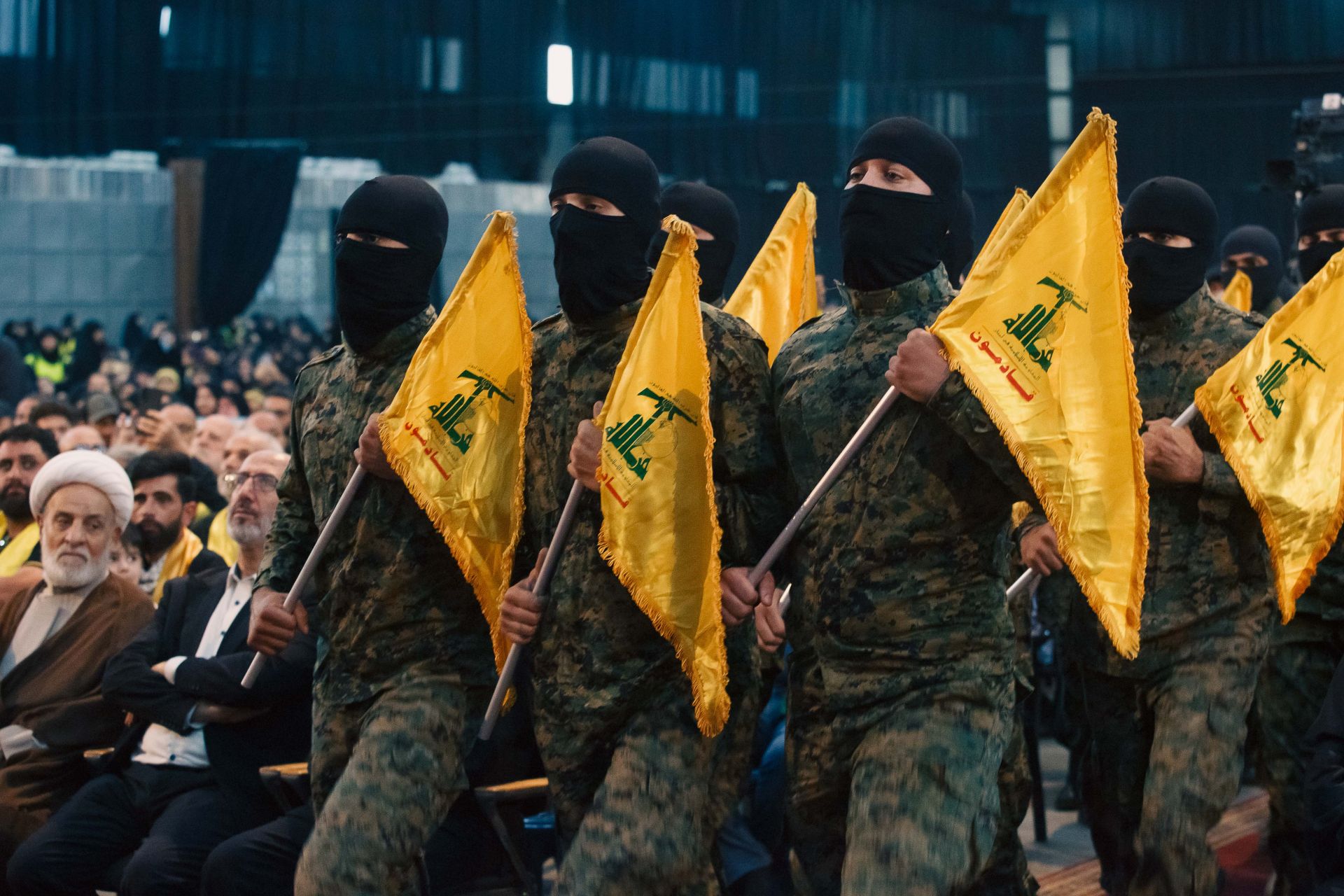In late September, autumn begins to show itself in Lebanon. With it have returned memories that many would rather have erased. A year ago, Israel’s war in Lebanon took a dramatic turn. After 11 months of a simmering conflict in the country’s south — triggered by Hezbollah’s unilateral opening of a front in support of Hamas in the wake of the Oct. 7 attacks — Israeli bombardment spread to Beirut’s southern suburbs and the Bekaa Valley. More than a million people were driven into temporary exile.
Even today, the scars of those airstrikes remain visible. In Beirut’s southern suburbs, ruins line the streets and facades stand gutted, reminders of the scale of the destruction. It was against this backdrop that, on Friday, Sept. 19, hundreds hurried through the neighborhood: Hezbollah had organized one of the first gatherings since the ceasefire to honor several of its figures killed over the past year.
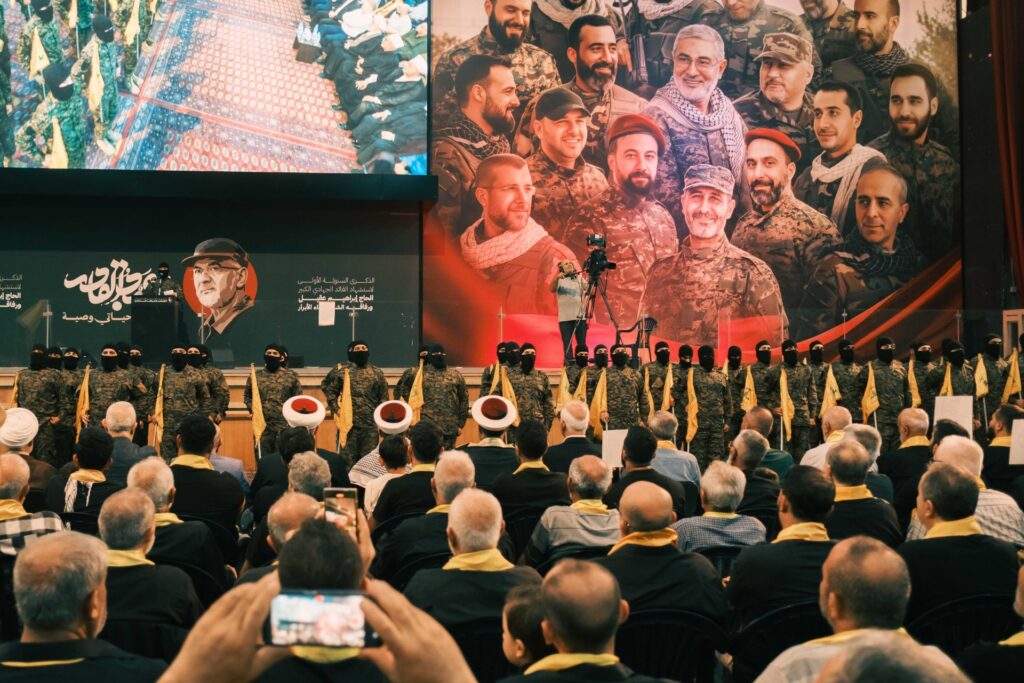
The broadcast of an address by the movement’s new secretary-general, Naim Qassem, had been announced. Many supporters, seemingly undeterred by the possibility of an Israeli strike, came in search of answers. Among them was Ali, in his 30s. Calm and discreet, he admitted that he is still in shock: “For a year now, it has been a nightmare. Because even if the bombs have stopped, we still do not know where we are headed. We do not know what will become of the resistance. The Israeli and American pressures for the party’s disarmament are intense, and this places the entire country in a critical situation,” he said.
In the audience, before the ceremony began, anger was palpable, and resentment ran deep. Many denounced what they see as injustice: Since the ceasefire was signed on Nov. 27, Hezbollah appears to have abided almost to the letter by the terms of the agreement, withdrawing, according to military sources, a vast share of its arsenal from southern Lebanon. While only a single ceasefire violation has been recorded on the Lebanese side, Israel, according to several Lebanese media outlets, is said to have committed more than 4,500 to date. The United Nations reports that at least 103 civilians have been killed in Israeli strikes since then. For Ali, the verdict is bitter: “The international community remains unmoved in the face of these crimes, and yet it is the side that respects the ceasefire that faces pressure and threats. It is immoral,” he said.
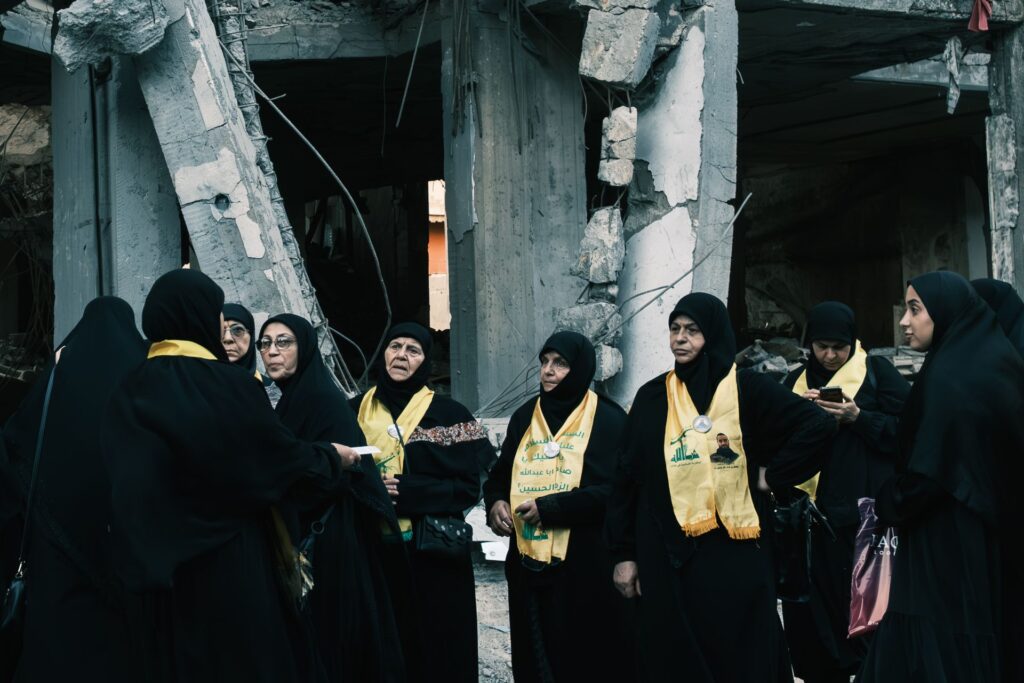
Over the past few weeks, pressure has been steadily mounting. The Israelis and Americans are not content with Hezbollah’s withdrawal from southern Lebanon: It is the organization’s full disarmament that is being demanded, in line with the agreed terms of the ceasefire and the stated aims of the new Lebanese government. In recent days, U.S. Sen. Lindsey Graham warned that this demand was “nonnegotiable,” even going so far as to declare that Washington could give Israel the green light to “do what it needs to do” if Hezbollah refused to hand over its heavy weapons to the Lebanese army. Rumors of a 60-day ultimatum have even circulated, feeding unease within the ranks of those loyal to the group.
The issue is all the more sensitive because Hezbollah’s arsenal has stirred Lebanese politics for decades, while the state, weak and corroded by internal quarrels, has never been able to reassert a monopoly on force. For many Lebanese, the moment therefore appears providential, a chance to restore a sovereignty lost long ago.
The situation is, without doubt, combustible. At the end of August, remarks by Hezbollah’s deputy political council chief, Mahmoud Qomati, sent shockwaves through the country as he declared that “the Lebanese government could not take away the weapons of the resistance without bloodshed.”
And so, on Sept. 19, after a series of tributes to fallen members and a brief parade of unarmed fighters from the “Party of God,” the secretary-general’s speech, projected on giant screens, was scrutinized with great attention. The cleric would not take long to surprise the audience: He called on Saudi Arabia, historic foe of the pro-Iranian axis, to “open a new page” with the resistance, a gesture that reflected the party’s internal debates — between a pragmatic wing eager to preserve Hezbollah’s political foothold in Lebanon, and another, more radical one that refuses any concession.
As the crowd dispersed, a small group of men lingered in discussion. Though all were in their 30s and professed confidence in Hezbollah’s leadership, the hand extended toward Saudi Arabia left them uneasy. Some interpreted the statement as part of a strategy to isolate Israel diplomatically; others considered it dangerous to “make a pact with the devil.” “Aside from that point, Sheikh Naim’s speech was very clear. He sent a message everyone could understand: The resistance is here to stay. If you want to negotiate, we are ready to do so. If you do not, it makes no difference, the resistance remains,” said one of them, a teardrop tattoo inked at the corner of his eye.
Another stepped in: “When I see a Lebanese state standing idle, while we are attacked every day in the South, in the Bekaa, elsewhere … on what basis should the resistance give up its weapons? To contain Israel? To draw borders? Of course we support Sheikh Naim, he acts in our interest. But if the state wants the weapons to be surrendered, the principle must be: why? Protect me first. Show me that you defend me, and then we can talk.”
A few yards away, in front of a ruined building, Hajjeh Ahlam Safaa, draped in a black abaya, insisted on optimism: “My son was killed during the war, and I am sure he did not die for nothing. I believe the new Lebanese leaders want peace with Israel, but that will never happen.”
Later, at the mausoleum of Hassan Nasrallah, away from prying ears, a deeply affected Hezbollah supporter confided: “We cannot resign ourselves to obey an Israeli diktat after what they have done to us, what they have done to the Palestinians. It is not possible. If Hezbollah gives up its weapons, then Lebanon, already so vulnerable, will be irretrievably lost. It is a sad reality, but every Lebanese knows it.”
The man, who said he does not believe in any change of relations with Saudi Arabia, did not hide his bitterness: “No one will tell you so openly, but many of us think the same. We were deeply marked by Iran’s abandonment. It struck Israel when its own stability was at stake, but let Gaza be razed and Nasrallah be killed without reacting. For of all the so-called ‘Axis of Resistance,’ it is we who have borne the heaviest losses. Hezbollah acted for Palestine, but not with all its force, because it did not want all of Lebanon to pay the price. This is the result.”
Perched at nearly 4,000 feet above sea level, Kfar Chouba, a rugged town in southern Lebanon, feels like the end of the world. The village brushes up against the withdrawal line drawn by the U.N. in 2000 — a blurred frontier between Lebanon, Israel and the Golan — and lives in the shadow of three hills occupied by the Israeli army since the early 1970s, their positions visible to the naked eye.
Inside the village, its alleyways still bear the scars of the war that pitted the Israeli army against Hezbollah for months: fierce battles, airstrikes and ground incursions. Entire neighborhoods lie in ruins as a result.
In this landscape of desolation, Karam Abdoul Fateh, in his 60s, was going about his work. Amid the ruins of three family homes that once overlooked the plain, he was repainting the boards of a prefabricated structure he is setting up. He has invested $10,000 in this makeshift dwelling, alone, “with no one’s help.”
In this predominantly Sunni village, Hezbollah’s regional entrenchment divides opinion. Some residents see the Shiite militia-party as the only force capable of defending southern Lebanon; others make no secret of their distrust, even hostility, toward its fighters.
Abdoul Fateh himself has had run-ins with some of them. A clash in the village center with Hezbollah fighters led to his later being questioned by Lebanese General Security. “We need a strong state,” he said gravely, “for the parties to stop playing the card of their own survival, and finally to serve this country.”
A few hundred yards away, in an old house still standing, three generations gathered around a hookah in the family living room. Here, recent remarks by Benjamin Netanyahu — brandishing a messianic map of a “Greater Israel” encompassing not only occupied Palestine but also parts of Lebanon, Syria, Jordan and even Egypt — were stoking deep anxiety. “Even if the weapons were surrendered, we fear nothing would stop the Israelis. Is it really about the weapons? Many of us doubt it,” Mohammad said.
Zahia Kassab, 97, listened attentively to her grandchildren’s debate. The matriarch, whom her family proudly describes as “older than the state of Israel,” has lost nothing of her memory. For her, the Hezbollah question is “just one more episode” in a life scarred by endless wars.
“Since 1948, our existence has been a succession of hardships. The destruction of our homes, the exiles, the returns and reconstructions, then the destruction again. Lands that belong to us, for which we hold deeds of ownership, were taken by Israel. I have never been able to go back,” she said. “Hezbollah didn’t exist at that time,” someone in the gathering reminded her sarcastically.
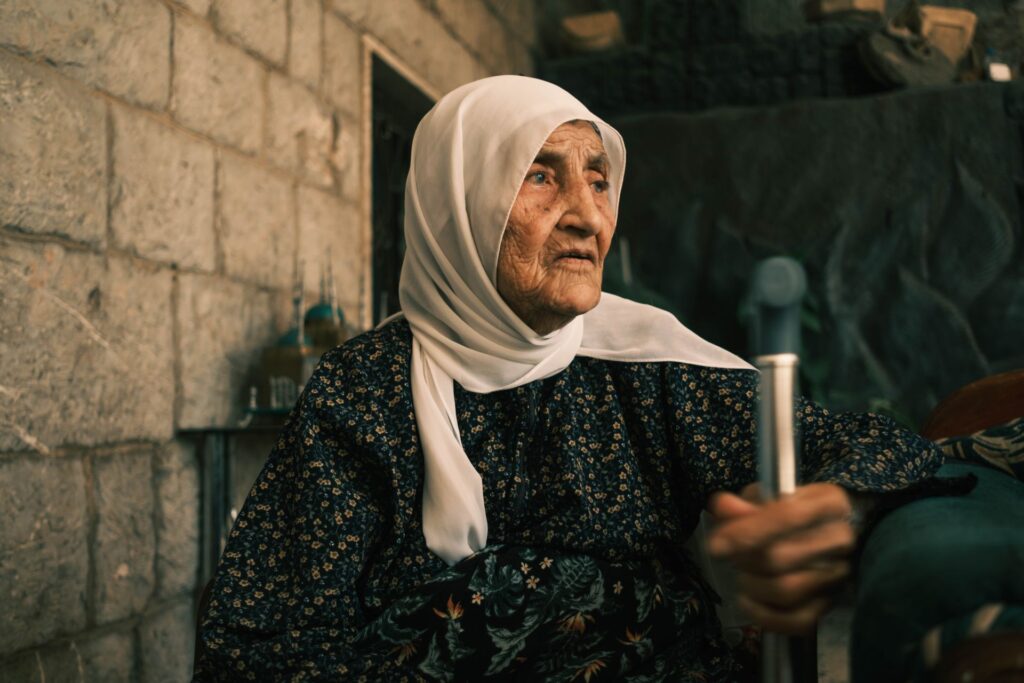
A little further on was the village mayor, Kassem Kadri, who also believes that successive Israeli offensives go beyond the Hezbollah question. The 81-year-old, with clear eyes and a shy smile, recalled the continuous military presence for more than half a century: “Of course, everyone is worried here. We have lived with the occupation of part of our land for decades, and we fear it will only get worse. We consider the only bulwark against Israel’s ambitions to be closing ranks behind the state and its army. But this cannot happen without international pressure on Israel.”
The villagers glanced at their phones. News had just broken: not far away, in Bint Jbeil, a double Israeli strike had killed a family of five, including children. “A massacre,” the residents of Kfar Chouba said collectively.
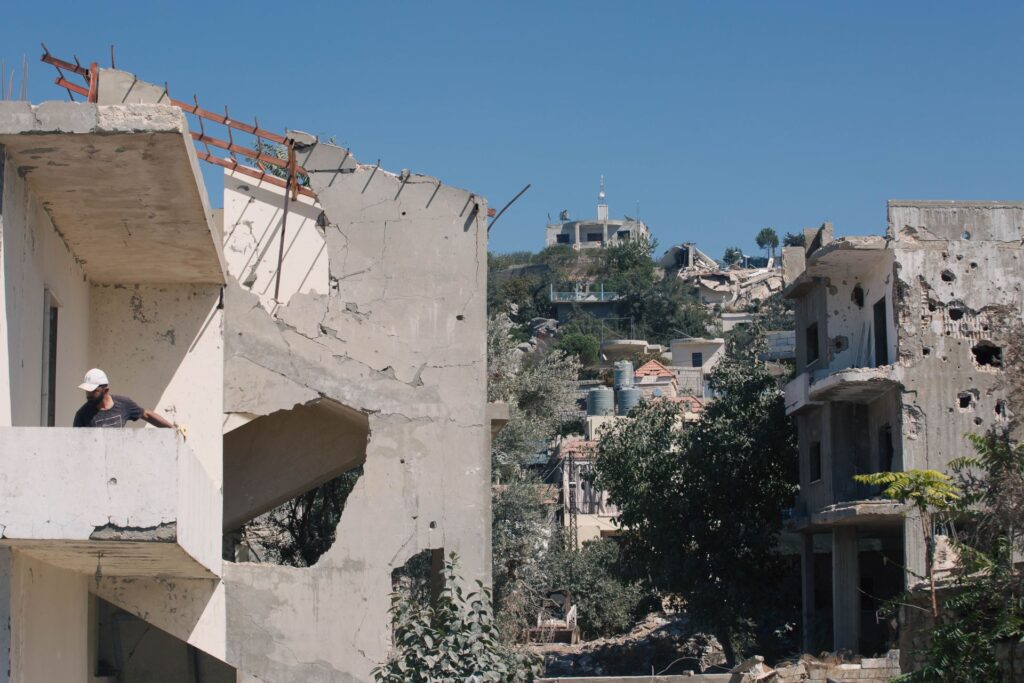
The fear of being targeted without warning is carried like a burden by many in southern Lebanon. Further north, on the outskirts of Nabatieh, the region’s major Shiite city, Rasha and Maryam had arrived to help a friend. On Sept. 15, an Israeli strike destroyed the apartment next to hers, wounding around 10 people in the building.
Inside, everything was in disarray. “The apartment had been marked by the Israeli army on a map during the war, with an evacuation order. Since then, it has remained unoccupied. They ended up bombing it a year later, without warning,” said the tenant, still shaken by the blast.
Rasha and Maryam, visibly downcast, were blunt: “This ceasefire is one-sided. We do not feel safe. How can we live with dignity with fear in our hearts?”
If the tenants of the building clearly did not appear to be members of Hezbollah, the center of Nabatieh is unmistakably one of the group’s strongholds. Mounted on scooters or tuk-tuks (motorized rickshaws), Hezbollah members patrol the city center, checking those they deem suspicious — enough to cast serious doubt on the army’s supposed reassertion of control in southern Lebanon.
In a local cultural center, a discussion group brings together artists from different backgrounds. Between walls adorned with works recalling the war, the conversation flowed freely. The mere mention of the Lebanese army’s role and presence provoked general laughter. Mohamed, a 41-year-old painter, took the floor: “Since the civil war in the 1980s, we have been almost a territory detached from the rest of the country. When there is no strong state, something else arises in its place.”
“We didn’t see the army during the war. The resistance [Hezbollah fighters] moved northward in compliance with the terms of the ceasefire, but here, in reality, no one came. We want a strong state, we do not wish to be under the control of a militia, but questions remain: We refuse a state that does not assume the duty of defending us, of defending the country, and of resisting,” cut in a young photojournalist.
A little further away, out of earshot, Hezbollah opponents who requested anonymity vented their anger: “Of course the Israelis are a danger to us, they are a danger to the whole region. But Hezbollah is a disaster for this country. How can we accept that it places its survival before that of the nation? How can we accept that its supporters threaten other Lebanese? How dare they, after all our country has endured, still threaten to turn their weapons against us?”
A woman in her 30s continued: “The Lebanese are not blind. We have all, at one time or another, suffered from Israel’s cruelty. But today, it is our people who must take a stand, who must support the Palestinians. We can no longer settle for being pawns of the Islamic Republic in its geopolitical calculations.”
Yet as the weeks go by, the fear of a new large-scale Israeli offensive is growing ever more pressing. In the border village of Kfar Kila, in the shadow of the separation wall and only a few hundred yards from the Israeli town of Metula, 65-year-old Hassan Jamil Shami stood in what was once the village’s main street. For him, this place, which, before Oct. 7, 2023, counted some 5,000 inhabitants, was far more than a birthplace or a line on his civil registry entry. It was the town that contained his entire life, and part of his very DNA. “Our land, we learned to love it in its darkest hours, by repairing the damage done to it in the different wars, when it was occupied by the enemy, then liberated. I came back just after the ceasefire; never would I have imagined being confronted with this,” he said, his throat tightening.
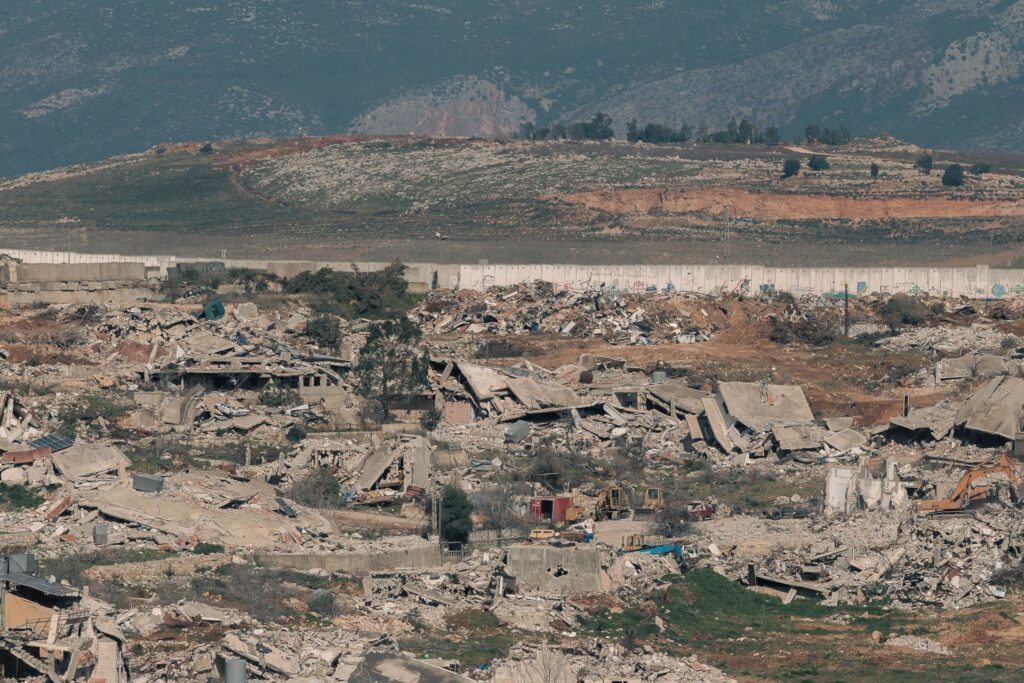
Here, the Israelis still keep a foothold on Lebanese territory. Their soldiers, clearly visible behind a concrete wall, regularly fire on those who come too close, according to locals. “Many fear the Israeli war will resume. For us, it never really ended. They do everything to make sure our village never comes back to life,” Shami said.
Lebanon, however, remains mired in uncertainty: While the crucial question of disarmament shows no sign of being resolved — with all the risks that entails — the neutralization of Hezbollah’s weapons south of the Litani River continues. The Lebanese army says it has dismantled around 80% of Hezbollah’s positions, figures confirmed both by the United Nations Interim Force in Lebanon and by the monitoring commission.
Will that be enough? That is the question. And for now, no one seems able to envisage even the beginnings of an answer. Karim Emile Bitar, professor of international relations at Saint Joseph University of Beirut, explained: “Hezbollah is also determined to dig in its heels because they heard loud and clear the statements of U.S. envoy Tom Barrack, who very candidly acknowledged that the United States simply could not guarantee that Israel would abide by the cessation of hostilities agreement, that the United States was unwilling to use its leverage on Israel to get Israel to withdraw from the five hilltops that are overseeing most villages in South Lebanon. So, when you have a U.S. envoy acknowledging that Hezbollah has zero incentive to surrender its weapons, how can we be surprised if the secretary-general of Hezbollah refuses to play the game?”
Is this a turning point in the current dynamic, one that could indefinitely place Lebanon under the threat of Israeli strikes? Many Lebanese seem to believe so. “If this plan is implemented, it would be the first time since 1969 and the Cairo Agreements that the Lebanese army would have the monopoly of legitimate use of force in Lebanon, and therefore a state that is no longer held hostage by nonstate actors,” Bitar stressed.
He concluded: “It is very important for the Lebanese army to establish its authority, but it is also very important to prevent Lebanon’s fragmentation and to avoid giving the impression that the Shiite community is being marginalized. I believe the main challenge today is not only to find a solution to Hezbollah’s military arsenal, but also to promote an inclusive approach that would preserve Lebanon’s territorial integrity and unity. Otherwise, every few months or every few years, we will once again be confronted with the same endless scenario, where Israel seeks to cut Tehran’s arms, and other powers intervene to maintain a capacity for deterrence against Israel.”
“Spotlight” is a newsletter about underreported cultural trends and news from around the world, emailed to subscribers twice a week. Sign up here.



